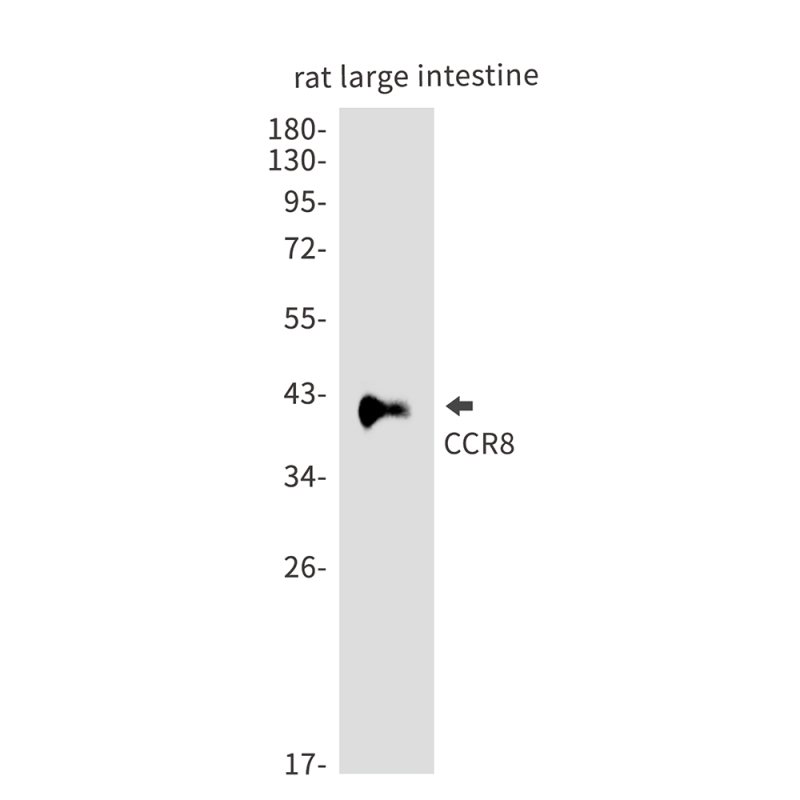
| WB | 1/500-1/1000 | Rat |
| IF | 咨询技术 | Rat |
| IHC | 咨询技术 | Rat |
| ICC | 1/50-1/200 | Rat |
| FCM | 1/50-1/100 | Rat |
| Elisa | 咨询技术 | Rat |
| Aliases | CKRL1; CMKBR8; CMKBRL2 |
| Entrez GeneID | 1237 |
| WB Predicted band size | Calculated MW: 41 kDa; Observed MW: 41 kDa |
| Host/Isotype | Rabbit IgG |
| Antibody Type | Primary antibody |
| Storage | Store at 4°C short term. Aliquot and store at -20°C long term. Avoid freeze/thaw cycles. |
| Species Reactivity | Rat |
| Immunogen | A synthetic peptide of human CCR8 |
| Formulation | Purified antibody in TBS with 0.05% sodium azide,0.05%BSA and 50% glycerol. |
+ +
以下是关于CCR8抗体的3篇代表性文献的示例(内容基于公开研究趋势,具体文献需根据实际数据库检索确认):
---
1. **文献名称**:*Targeting CCR8 in tumor-associated regulatory T cells induces antitumor immunity*
**作者**:Smith A, et al.
**摘要**:本研究证明抗CCR8抗体通过选择性耗竭肿瘤微环境中的调节性T细胞(Treg),增强抗肿瘤免疫反应。在小鼠模型中,单药治疗显著抑制肿瘤生长,并与PD-1抑制剂联用表现出协同效应。
2. **文献名称**:*Preclinical characterization of a novel anti-CCR8 antibody for cancer immunotherapy*
**作者**:Zhang Y, et al.
**摘要**:报道一种高特异性人源化抗CCR8抗体的临床前开发,证明其可有效阻断CCL1/CCR8信号通路,减少Treg浸润,并提升效应T细胞活性,支持其进入Ⅰ期临床试验。
3. **文献名称**:*Structural basis of CCR8 recognition by monoclonal antibodies for cancer therapy*
**作者**:Lee J, et al.
**摘要**:通过冷冻电镜解析抗CCR8抗体与受体的结合表位,揭示其特异性识别机制,为优化抗体药物设计提供结构学依据,并验证其在抑制Treg迁移中的功能。
---
**注**:以上为模拟示例,实际文献需通过PubMed、Web of Science等平台以关键词“CCR8 antibody”、“cancer immunotherapy”检索获取最新研究。
CCR8 (C-C chemokine receptor type 8) is a G protein-coupled receptor that binds chemokines such as CCL1 and CCL18. It is primarily expressed on immune cells, including type 2 T helper (Th2) cells, regulatory T cells (Tregs), and tumor-infiltrating lymphocytes, playing a role in immune regulation and inflammatory responses. In oncology, CCR8 has gained attention due to its overexpression in tumor-associated Tregs, which suppress anti-tumor immunity. This makes CCR8 a potential therapeutic target for cancer immunotherapy, as blocking or depleting CCR8+ Tregs may enhance immune activity against tumors.
CCR8 antibodies are being developed as therapeutic agents, with strategies including antagonistic antibodies to disrupt CCR8 signaling or antibody-drug conjugates (ADCs) to selectively eliminate CCR8+ cells. Preclinical studies suggest CCR8-targeting antibodies can reduce Treg infiltration in tumors and synergize with checkpoint inhibitors. Additionally, CCR8 is implicated in allergic diseases and chronic inflammation, broadening its therapeutic relevance. However, challenges remain in ensuring specificity and minimizing off-target effects. Research continues to optimize antibody design and evaluate clinical efficacy in ongoing trials.
×